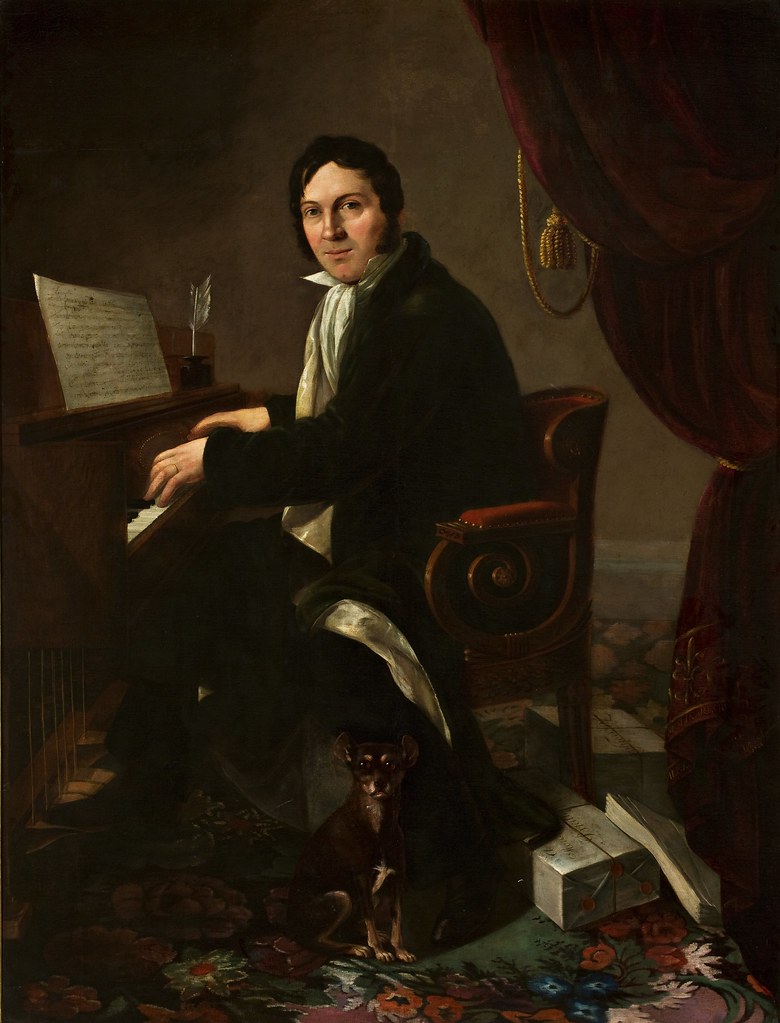Karol Kurpiński (1785-1857) - Henry VI at the Hunt
Performers: Teresa May-Czyzowska (soprano); Romuald Spychalski
(1928-2018, tenor); Z. Krzywicki (bass); Witold Malcuzynski (baritone);
R. Werlinski (tenor); S. Michonski (bass); J. Stocka (mezzosoprano);
Zygmunt Jankowski (bass);
Lódz Opera Orchestra; Lódz Opera Chorus;
Zygmund Latoszewski (1902-1995, conductor)
Further info: Karol Kurpiński (1785-1857) - Henry VI at the Hunt
---
Polish composer and conductor. He studied with his father Marcin
Kurpiński, an organist at Włoszakowice, and himself became organist at
Sarnów nearby in 1797. In 1808 he took a post as tutor to the
Rastawiecki family in Lwów, where he heard a number of Italian and
German operas, and in 1810 he settled in Warsaw. There he met the
dramatist Wojciech Bogusławski, known as the ‘father of Polish theatre’,
through whose influence he was appointed deputy conductor at the
National Theatre. In 1824 he was appointed principal conductor (on the
dismissal of Józef Elsner) and in that capacity he presented a repertory
of the highest quality, notably Mozart and Rossini, to Polish
audiences. In addition to opera he regularly conducted orchestral
concerts in the city; these included the first performances of Chopin's
two piano concertos. Kurpiński was also active as a teacher,
establishing (1835) the School of Singing and Declamation at the
National Theatre as a replacement for the conservatory, which had been
closed down after the 1830 insurrection. He also founded and contributed
regularly to the journal Tygodnik muzyczny (‘Music Weekly’; later
Tygodnik muzyczny i dramatyczny), the main forum for musical debate in
Warsaw in the first half of the century. In 1823, just before his
appointment as principal conductor at the National Theatre, he embarked
on a European tour that took in all the major musical centres.
Kurpiński's creative work slackened noticeably following the tour, and
it seems possible that he felt his own music to be somewhat
anachronistic in relation to the new musical styles of the 1820s. His
later life was given over mainly to teaching, and by the time of his
death he was largely forgotten.
Although he composed in many genres, Kurpiński's contribution was mainly
to opera. He was the major Polish opera composer before Moniuszko, and
his output (most of it composed for the National Theatre in Warsaw) was
considerable. Many of his operas received only a few performances before
disappearing from the repertory, but some had more lasting success,
notably Szarlatan, czyli Wskrzeszenie umarłych (‘The Charlatan, or The
Raising of the Dead’), Jadwiga królowa Polska (‘Jadwiga, Queen of
Poland’) and Zamek na Czorsztynie, cyli Bojomir i Wanda (‘The Castle of
Czorsztyn, or Bojomir and Wanda’). For the most part his stage works
were vaudevilles or Singspiele, interleaving songs and choruses with
spoken dialogue. Nine of Kurpiński's 26 known stage works survive
complete, and there are extracts from a further eight. It is clear from
the surviving works that the stylistic profile of his music was
distinctly Italian, responsive both to such late 18th-century composers
as Cimarosa and Paisiello and to such later masters as Rossini. At the
same time Kurpiński laid some of the foundations of a national operatic
style by drawing on themes from Polish history and folklore and making
use of Polish national dances and folksongs. His most ambitious stage
work was probably Jadwiga, a full-scale opera rather than a vaudeville,
and similar in its broad design to the historical operas of Spontini. In
the 1990s attempts were made to revive some of Kurpiński's operas in
Poland, with notable success in the cases of Pałac Lucypera (‘Lucifer's
Palace’), Szarlatan and Zabobon.

Cap comentari:
Publica un comentari a l'entrada